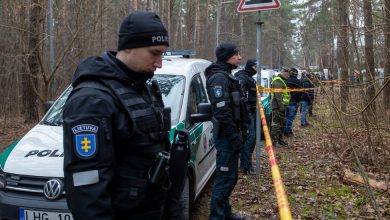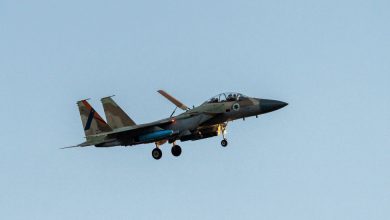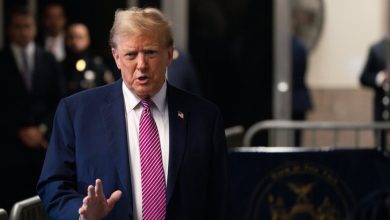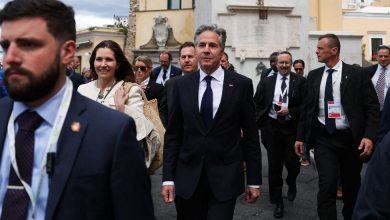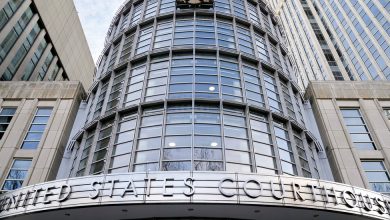Moscow Moves to Russify Seized Ukraine Land, Signaling Annexation

KRAKOW, Poland — Fresh from its triumph over the last armed Ukrainian resistance in the devastated city of Mariupol, Russia appeared to be laying the groundwork Thursday for annexing swaths of southeast Ukraine, described by a high-ranking Kremlin official as having a “worthy place in our Russian family.’’
The official, Marat Khusnullin, Russia’s deputy prime minister for infrastructure, toured the region this week and outlined plans to take full control of vital infrastructure, including Europe’s largest nuclear power plant, as Russia fortified its defensive positions there and exerted its authority over the local population.
“I came here to provide maximum opportunities for integration,” Mr. Khusnullin was quoted by Russian news media as saying.
In a further sign that Moscow was preparing to push for the Russification of the region — the way it has in Crimea since seizing it from Ukraine in 2014 — Russian officials have already moved to introduce the ruble currency, install proxy politicians in local governments, impose new school curriculums, reroute internet servers through Russia and cut the population off from Ukrainian broadcasts.
Mr. Khusnullin said Russia even intended to charge Ukraine for electricity generated by the Ukrainian nuclear plant that Russian forces commandeered in the early weeks of the invasion — a plan that Ukraine described as extortion.
Russia’s moves came as the United States sought to further escalate pressure on the Kremlin. President Biden vowed to help gain speedy approval of applications to join NATO by formerly neutral Finland and Sweden, as he welcomed the leaders of those countries to the White House and as U.S. officials expressed confidence that they could satisfy Turkey’s objections to Finnish and Swedish membership. And the Senate overwhelmingly approved a $40 billion aid package for Ukraine that Mr. Biden was set to sign into law.
Even as the Russian authorities projected control over a Ukrainian region that is culturally close to Russia, President Vladimir V. Putin appeared to be punishing military subordinates for blunders in the three-month-old invasion.
A report by Britain’s defense intelligence agency suggested the Kremlin was conducting a purge of senior commanders deemed responsible for the failures of Russia’s initial strategy to seize much more Ukraine territory, including the capital, Kyiv, and second-largest city, Kharkiv. The report raised the question of whether Mr. Putin retained faith in his chief of the general staff, Valery Gerasimov.
The Russians have said nothing about any changes in the military leadership.
Russia’s new, narrower strategy of focusing on Ukraine’s east has proved more successful than its initially greater aims, even as its forces have retreated in the northeast and struggled to gain ground in the eastern Donbas region.
Following the longest battle of the war, Russian soldiers completed their capture of Mariupol on Tuesday after having seized control of the sprawling Azovstal steel plant, the last redoubt of Ukrainian defenders. More than 700 fighters from the Azov battalion, die-hards who had made a final stand against the Russians from the plant, surrendered between Wednesday and Thursday, according to the Russian Defense Ministry, bringing the total number of captives to 1,730.
The Kremlin has been using the mass surrender for propaganda purposes, describing its captives as terrorists and Nazi war criminals, and framing the conquest of Mariupol as a turning point in the conflict.
Although much of Mariupol is ruined, the capture of the port city is expected to bring Russia concrete benefits. It will complete a long-sought land bridge between the Russian-controlled Crimean peninsula to the south and the adjoining region known as Donbas, where pro-Russian separatists have battled Ukrainian forces since the Crimea annexation.
With Mariupol captured, Russian troops are now freed to help entrench Russia’s authority over the rest of the eastern region — well short of Moscow’s initial push to control all of Ukraine, but strong leverage in any future peace negotiations.
The fighting has settled into a stalemate along most of the front.
Stiff Ukrainian resistance is forcing Russian troops to fight in smaller formations and seek more limited objectives elsewhere in the Donbas region, a senior Pentagon official said on Thursday.
“They’re going after smaller objectives,” the senior official said of the Russian goals, speaking on condition of anonymity to discuss operational details of American defense intelligence work. “And sometimes those objectives are only maintained for a short period of time before the Ukrainians take them back. They’re just being more modest in what they’re trying to go after.”
The shift in Russian tactics reflects not only the resilient Ukrainian defense, but also the nagging command, logistics and morale problems that continued to bedevil Russian commanders, especially in the hotly contested Donbas, the official said.
The southern region under Russian control covers a vast expanse that includes Ukraine’s agricultural heartland and several key ports. Along with Russia’s naval dominion in the Black Sea, annexation would tighten Moscow’s stranglehold on the Ukrainian economy and solidify its blockade of Ukraine’s southern coast.
In another possible sign of steps to entrench Russia’s control, its troops closed checkpoints on Thursday for civilians crossing between Russian-occupied zones and Ukrainian controlled areas in two regions, Kherson and Zaporizhzhia, according to the Ukrainian military and local authorities.
At one checkpoint, near the town of Vasilyevka, a line of cars transporting mostly women and children seeking to evacuate Russian-held areas stretched through farm fields. Ukrainian officials estimated more than 1,000 cars waited at the crossing, said Zlata Nekrasova, the deputy governor of the Ukrainian regional government in Zaporizhzhia.
The Ukrainians have accused Russia of forcibly deporting thousands to Russia and witnesses have described increasingly repressive efforts to enforce Russian rule.
The Kremlin has sought to portray its actions as reflecting popular will. Dmitri S. Peskov, the Kremlin’s spokesman, appeared to play down the significance of Mr. Khusnullin’s statements signaling annexation, saying only locals could decide.
But in a move that some analysts regarded as reflecting confusion within the Russian leadership about how to secure Ukrainian areas seized by Russia, a group of lawmakers on Thursday submitted a bill to the State Duma that would allow Mr. Putin to establish “temporary administrations on territories where Russia’s army conducts military operations.”
Mr. Khusnullin said that Russia would soon begin charging Ukraine for electricity from the Zaporizhzhia Nuclear Power Plant, which Russia has controlled since early March. When fully operational, the plant can produce enough energy for four million homes.
Ukraine’s energy provider, NPC Ukrenergo, which called Mr. Khusnullin’s statement nuclear blackmail, said the real aim was to give Russia electricity leverage over Ukraine and the rest of Europe. It noted that the plant was part of the Ukrainian power grid and unequipped to deliver power to Russia.
Moscow’s announcements were also part of a propaganda campaign aimed at conveying control over areas where its grip is less solid. Military analysts have said Russia’s forces could still face Ukrainian uprisings and counteroffensives.
Russia-Ukraine War: Key Developments
U.S. aid. The Senate overwhelmingly approved a $40 billion aid package for Ukraine, bringing the total American investment in the war to $54 billion in just over two months. The measure is the latest proof of the bipartisan support on Capitol Hill for helping Ukraine fight Russia.
In Mariupol. Hundreds more Ukrainian fighters that had been in a steel plant in Mariupol surrendered to Russia. Ukrainian officials have said the fighters will be exchanged for Russian prisoners of war, but they have provided no details about the agreement.
NATO’s expansion. Turkey’s president, Recep Tayyip Erdogan, said he was determined to “say no to Finland and Sweden’s NATO membership,” pointing to the countries’ stance toward Kurdish militant groups he regards as terrorist organizations.
War crimes trial. A Russian soldier pleaded guilty in a Kyiv court to having shot a civilian. This is the first trial Ukraine has conducted for an act that could be considered a war crime since Russia launched its invasion.
Russia’s invasion in February, spearheaded by a rapid advance of tanks and helicopters, ultimately led to many Russian casualties, including some senior generals on the battlefield. The finger-pointing has started, Britain’s defense intelligence agency said in its Thursday report.
It said the commander of the elite 1st Guards Tank Army, Lt. Gen. Serhiy Kisel, had been suspended for failure to capture Kharkiv, where Ukrainian forces have not only counterattacked but driven the invaders back toward the Russian border 40 miles away.
The British agency also reported that the commander of Russia’s Black Sea fleet, Vice Adm. Igor Osipov, had likely been suspended following the April sinking of the fleet’s flagship, the cruiser Moskva. Asked about the report, a senior Pentagon went further, saying the commander had been dismissed.
General Gerasimov, Russia’s highest ranking uniformed officer, “likely remains in post but it is unclear whether he retains the confidence” of Mr. Putin, the British report said.
But in a signal that General Gerasimov remained in good standing, he spoke on Thursday by phone with Gen. Mark A. Milley, the chairman of the Joint Chiefs of Staff, the Pentagon said. It was their first call since the invasion.
In the port city of Kherson, in the south near the border with Crimea, Mr. Khusnullin inspected infrastructure, including the port, a cargo railway station and a factory.
“We will live and work together,” he said, adding that Russia had already allocated funds to restore the city’s roads.
“We will now eat tomatoes and tomato paste more often in Russia thanks to the work of Kherson’s agricultural producers,” Mr. Khusnullin said, alluding to Kherson’s longtime role as a breadbasket and a global exporter.
But even as he spoke, Ukrainian officials said a convoy of civilian cars trying to flee the region came under fire from Russian soldiers. Roughly half of the million people who once lived in the region have fled, with witnesses who escaped offering harrowing stories of Russian repression.
In Kyiv, a committee in Ukraine’s Parliament accused Russia of having robbed Kherson of 400,000 tons of grain, sending it to Russia and creating conditions that “may lead to famine in the occupied territories.”
A Russian naval blockade of Ukraine’s ports is preventing Ukraine from exporting millions more tons, putting tens of millions of people worldwide at risk of hunger and famine, the U.N. secretary general, António Guterres, said Thursday at a U.N. conference on food security.
Marc Santora reported from Krakow, Poland, Ivan Nechepurenko from Tbilisi, Georgia, and Norimitsu Onishi from Paris. Reporting was contributed by Matthew Mpoke Bigg from Krakow, Eric Schmitt, Helene Cooper and David E. Sanger from Washington, Valerie Hopkins and Andrew E. Kramer from Kyiv, Shashank Bengali from London, Anton Troianovski from Brussels and Rick Gladstone from New York.
